|
|
|
Sort Order |
|
|
|
Items / Page
|
|
|
|
|
|
|
| Srl | Item |
| 1 |
ID:
142193
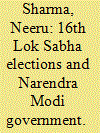

|
|
|
|
|
| Publication |
DelhI, Bookman, 2015.
|
| Description |
240p.hbk
|
| Standard Number |
9788193167434
|
|
|
|
|
|
|
|
|
|
|
|
Copies: C:1/I:0,R:0,Q:0
Circulation
| Accession# | Call# | Current Location | Status | Policy | Location |
| 058391 | 320.54/SHA 058391 | Main | On Shelf | General | |
|
|
|
|
| 2 |
ID:
137858
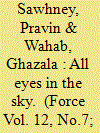

|
|
|
|
|
| Summary/Abstract |
At Aero India 2015, the star of the show was not an aerial platform performing jaw-dropping stunts in the air, though there were a few aerobatic teams. The star was Prime Minister Narendra Modi, who made a debut of sorts in the presence of senior (if not the top) defence and aerospace business executives of the world.
|
|
|
|
|
|
|
|
|
|
|
|
|
|
|
|
| 3 |
ID:
155180


|
|
|
|
|
| Summary/Abstract |
The first decade of the twenty-first century saw the chants of the rise of an Indian superpower. These claims of the twenty-first century as India’s century were not only based on the massive economic growth that the country saw in the post-1991 liberalisation period, and the concomitant boost in military infrastructure, but also by virtue of its having the biggest functional democracy, an influential multi-million plus diaspora, the sway of Bollywood in the region and abroad and the spectacular religious-linguistic diversity of the country. From conducting mega disaster-relief operations during the 2004 tsunami to effectuating the world’s largest civil evacuation during Operation Rahat, India has ceaselessly augmented its soft power potential to project its national power in the region. This article is an attempt to analyse the possibilities and challenges that India faces in the effective functioning of its soft power in the region. It also remarks as to how India’s soft power limitations can be quashed by integrating a smart power approach in its foreign policy by strengthening existent digital and public diplomacy infrastructure.
|
|
|
|
|
|
|
|
|
|
|
|
|
|
|
|
| 4 |
ID:
131130
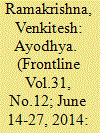

|
|
|
|
|
| Publication |
2014.
|
| Summary/Abstract |
In the new political climate, there is a pronounced assertiveness among Sangh Parivar outfits on core Hindutva programmes, including the construction of a Ram Temple in Ayodhya.
|
|
|
|
|
|
|
|
|
|
|
|
|
|
|
|
| 5 |
ID:
141363
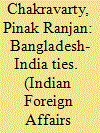

|
|
|
|
|
| Summary/Abstract |
The Land Boundary Agreement (LBA), finalized during the recent visit of Prime Minister Narendra Modi to Bangladesh in June this year, justifiably received top billing in the media. So did the Teesta water sharing agreement which could not be signed, thanks to domestic politics in India. The LBA has been implemented and enclaves, adverse possessions and demarcation of the land boundary implemented on August 1, 2015 in a time-bound manner. A lingering ghost of the post-colonial era has finally been exorcised, freeing Bangladesh-India relations from the shackles of the past. The Teesta water sharing agreement, however, is enmeshed in political horse trading, as well as disagreement between the Central government and the West Bengal State government on the water sharing formula.
|
|
|
|
|
|
|
|
|
|
|
|
|
|
|
|
| 6 |
ID:
170702
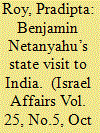

|
|
|
|
|
| Summary/Abstract |
A six-day visit by PM Benjamin Netanyahu to India on 14–19 January 2018 marked a new apogee in the renewed relationship between two old civilizations. It was a reciprocal visit to PM Narendra Modi’s visit to Israel in July 2017 to celebrate the Silver Jubilee year of the ‘Diplomatic Normalisation’ between the two states. Netanyahu’s visit took place not only against the backdrop of this enthusiasm, but also had concrete economic and political goals given that just a month before the visit New Delhi cancelled a $500 arms deal with Israel and voted against the Jewish state in the UNGA on the Jerusalem question. Through five public addresses, three media interviews and one road show, Netanyahu attempted to break longstanding anti-Israel stereotypes and show the Indian masses that they could be beneficiaries of Israel’s innovation and technological advancement. Amplified by a string of economic, high-tech, agricultural, and defence agreements, Netanyahu’s visit proved to be a success, whose positive implications will affect the bilateral relations for years to come.
|
|
|
|
|
|
|
|
|
|
|
|
|
|
|
|
| 7 |
ID:
173326


|
|
|
|
|
| Summary/Abstract |
Five aspects of the BJP's election campaign contributed to its success in 2019. The first is the personal appeal of the prime minister, which again played a major role, like it did in 2014, as Narendra Modi led a hyper-personalized campaign. Second, this campaign focused on security-related themes which were especially relevant in the context of the India-Pakistan tensions. Third, the BJP campaign strategy was backed by the most formidable election campaign machinery assembled by any party in India since Independence. Fourth, the BJP saturated the public space with the prime minister's image, adroitly using the traditional mainstream media as well as social media. The party used religious appeal to address its core base of supporters while projecting the prime minister's image as a protector and sentinel. Fifth, the latter three aspects of the BJP's campaign were fuelled by unprecedented levels of campaign expenditure and by the opacity of political funding in India, which the BJP had made more impenetrable through the introduction of electoral bonds. The combination of these factors show that the 2019 elections were not business as usual; their singularity largely due to the decline of institutions regulating the electoral process, including the Election Commission of India.
|
|
|
|
|
|
|
|
|
|
|
|
|
|
|
|
| 8 |
ID:
135575
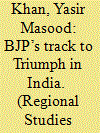

|
|
|
|
|
| Summary/Abstract |
The political landscape of India witnessed a historical about-turn when the Bharatiya Janta Party (BJP) decisively ended the decade-long political monopoly of the Indian National Congress (INC). it goes without saying that the unprecedented victory of the BJP in the recent elections has out-distanced even its own major success of 1998. No doubt, there are a number of crucial factors which paved the way for its resounding success. one of course, is the political and ideological vacuum created by the rival INC. this said, however, this paper seeks to uncover other distinct and multifaceted factors which led to the overwhelming rise of the tide of Hindutva, and this despite the fact that India is touted as being a secular and pluralistic democratic state.
|
|
|
|
|
|
|
|
|
|
|
|
|
|
|
|
| 9 |
ID:
131122
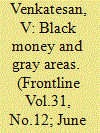

|
|
|
|
|
| Publication |
2014.
|
| Summary/Abstract |
The decision to constitute a special investigation team to investigate cases of black money stashed away in foreign banks will prove to be an acid test for the Narendra Modi government as the fight against the black economy, calls for the strong political will.
|
|
|
|
|
|
|
|
|
|
|
|
|
|
|
|
| 10 |
ID:
138637
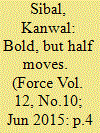

|
|
|
|
|
| Summary/Abstract |
During his China visit, Prime Minister Narendra Modi’s unusual candour in speaking about the problems that hold back the India-China relationship is a refreshing change from the past discourse of emphasising only improved border management and acceptance that the border issue will take a long time to resolve and should not impede the rest of the relationship from moving forward.
|
|
|
|
|
|
|
|
|
|
|
|
|
|
|
|
| 11 |
ID:
185662
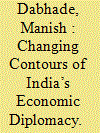

|
|
|
|
|
| Summary/Abstract |
This article explores India’s economic diplomacy since its early years of Independence, from the margins to a relative significance in the global economic hierarchy. It begins by identifying the constant, governing first principles and core objectives of India’s economic diplomacy that have remained constant over the years. The first three sections broadly embody the distinctive phases of India’s economic diplomacy, each laced with turning points, challenges and shifts entailed therein. The article ends with a concluding section that provides an analysis of India’s economic diplomacy in terms of broader trends, current challenges and the road ahead in the policy-relevant future.
|
|
|
|
|
|
|
|
|
|
|
|
|
|
|
|
| 12 |
ID:
102112
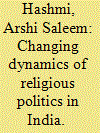

|
|
|
| 13 |
ID:
138131
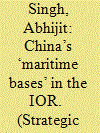

|
|
|
|
|
| Summary/Abstract |
After a successful visit by Prime Minister Narendra Modi to Colombo in March, Indian policy elite are hopeful that the new Sri Lankan government will roll-back some of the geopolitical concessions made by the Rajapaksa regime to Beijing, thereby restoring India’s primacy in its near neighbourhood. India’s policy elite are hopeful that Maithripala Sirisena, the new president, will roll back some of the geopolitical concessions made by his predecessor to Beijing, thereby restoring Indian primacy in its near neighbourhood.
New Delhi’s maritime analysts, however, remain a worried lot. Ever since a PLA-Navy (PLA-N) submarine docked twice in Colombo last year, Indian sea-power thinkers have been considering the prospect of a permanent Chinese naval presence in the Indian Ocean. Since November 2014, there have been strong rumours of a possible PLA-N base in the Indian Ocean Region (IOR). Media reports have indicated that Beijing was discussing a plan for multiple basing facilities in the Indian Ocean. An alarmed New Delhi even revived an old proposal for an Indian Ocean Zone of Peace—all in the hope that it would dissuade China from appropriating valuable space in its ‘strategic backyard’.
|
|
|
|
|
|
|
|
|
|
|
|
|
|
|
|
| 14 |
ID:
142844
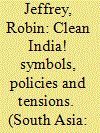

|
|
|
|
|
| Summary/Abstract |
This essay assesses the Swachh Bharat! or Clean India! campaign of Prime Minister Narendra Modi's government. The essay identifies the immense scope of the task—to create a ‘clean India’ by 2019—the pressures that make improved public sanitation urgent and the prime minister's experience in the state of Gujarat that may encourage him to believe that achievements are possible. The essay gauges the political risks and benefits for a prime minister noted for his media proficiency and keen sense of symbolism.
|
|
|
|
|
|
|
|
|
|
|
|
|
|
|
|
| 15 |
ID:
131275


|
|
|
| 16 |
ID:
131135
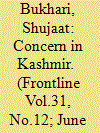

|
|
|
|
|
| Publication |
2014.
|
| Summary/Abstract |
The controversy over Article 370 has affected the psyche of the average Kashmiri and give rise to the fear that certain important right that the people of the state enjoy are going to be snatched away.
|
|
|
|
|
|
|
|
|
|
|
|
|
|
|
|
| 17 |
ID:
129385
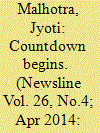

|
|
|
|
|
| Publication |
2014.
|
| Summary/Abstract |
Who will emerge victorious in India's May 2014 elections? Shehzada Rahul, the chaiwala form Gujarat, Narendra Modi, AK 49' Arvidn Kejriwala, or someone else? experts predict a land-slide victory for the BJP but history- as previously proven-may have something else in store for India.
|
|
|
|
|
|
|
|
|
|
|
|
|
|
|
|
| 18 |
ID:
131146
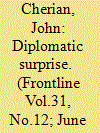

|
|
|
|
|
| Publication |
2014.
|
| Summary/Abstract |
The invitation to the Pakistan prime minister to attend the swearing-in of Narendra Modi may have been a diplomatic coup but Nawaz Sharif agreed to come as he was looking for something more substantial than a photo-op.
|
|
|
|
|
|
|
|
|
|
|
|
|
|
|
|
| 19 |
ID:
144002
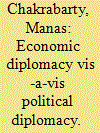

|
|
|
|
|
| Summary/Abstract |
As Prime Minister Narendra Modi is pushing for closer political and – in line with his national priorities – economic ties with India’s neighbors as well as partners, every one’s eyes are on New Delhi’s new economic diplomacy policy. While economic diplomacy is most visible and most watched during high-level visits, the real challenge is to make it operate effectively all year long. Some steps in this direction were already taken under the previous government; the Modi government’s recent actions indicate that it intends to carry this further. It should be stated that Prime Minister Narendra Modi’s visits to Bhutan and Nepal, and the invitation of SAARC leaders to his swearing in ceremony, point to an acknowledgement that for India to prosper, the country needs to engage with its neighbours and work towards a stable and peaceful region.
|
|
|
|
|
|
|
|
|
|
|
|
|
|
|
|
| 20 |
ID:
138639
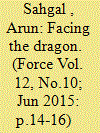

|
|
|
|
|
| Summary/Abstract |
There are multiple interpretations of Prime Minister Narendra Modi’s recent visit to China. Fundamentally, while there has been significant movement on the economic side in terms of trade, investment and opening of markets, there has been little progress on major irritants such as boundary or water issues. There remains an unmistakable shadow of lack of mutual trust and unwillingness on the part of the Chinese to significantly address these irritants. In fact, during the visit an attempt was made to vitiate the atmosphere by showing an Indian map exclusive of Kashmir and Arunachal Pradesh.
|
|
|
|
|
|
|
|
|
|
|
|
|
|
|
|
|
|
|
|
|